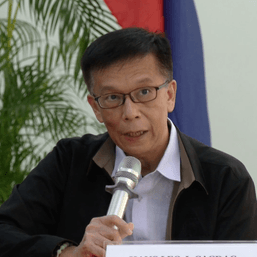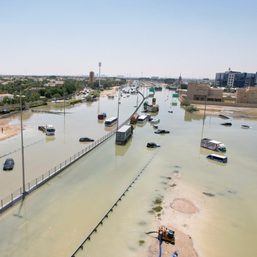SUMMARY
This is AI generated summarization, which may have errors. For context, always refer to the full article.
![[OPINION] Responding to the Anti-Terror Law from the United States](https://www.rappler.com/tachyon/2020/07/ispeak-responding-to-anti-terror-law.jpg)
RA 11479, or the Duterte regime’s Anti-Terror Law of 2020, took effect on midnight of July 18. Under this supposed national security law, Duterte will create an Anti-Terrorism council that can make warrantless arrests, freeze assets of suspects, and surveil suspects. Furthermore, as a result of the law’s vague definition of “terrorism,” the council would have the power to decide who is a terrorist. The long reach of the legislation also makes it potentially applicable to Filipinos abroad.
Through this law, Duterte fortifies his power by absorbing the functions granted to the judicial and legislative branches of the government. Sedition charges are now being filed against ordinary citizens critiquing the Duterte regime on social media. Duterte said that law-abiding citizens need not worry if they are not terrorists, but Duterte’s political machinery has expanded its energy from the vitriolic trolling of critics online, by broadening what the state perceives as “terror.”
The Commission on Human Rights reported on the difficulty in tracking down the sustained extrajudicial killings in the Philippines, especially within the militarized handling of the pandemic. Earlier this month, it was reported that there were 107 complaints on arrests and detention and 55 on extrajudicial killings. Authorities will also carry out house-to-house searches for people with or without COVID-19 symptoms, who will then be transferred to government-run isolation facilities. Government officers cited a Philippine law stating those refusing to cooperate may be fined or imprisoned. The house-to-house search that the state euphemistically calls “Oplan Kalinga,” kalinga meaning care, intimidates Filipinos seeking shelter from the pandemic in their own homes.
Intimidation occurs on a bigger scale, with the government striking at the media. Recently, the Manila Regional Trial Court found journalist Maria Ressa guilty of cyberlibel, in what critics believe was a politically motivated ruling. On July 10, 70 members of the Philippine Congress voted “no” on ABS-CBN’s appeal to renew their media franchise, affirming the spreading power of the Duterte regime. Our elders would remember the ABS-CBN shutdown during the Marcos dictatorship. This time, media censorship is even more staggering because of the display of complicity by state officials. The Philippines is already the 5th most dangerous country in the world for journalists. The future is not looking bright in a situation that mixes impunity with complicity.
We have seen throughout Duterte’s presidency, and in particular in the last couple of months, a targeting of those that stand in the name of democratic freedoms and human rights. The recent arrests of activists such as those involved in a Global Pride March as well as Senator Bong Go’s deployment of the National Bureau of Investigation to look into social media criticisms of the senator are worrying signs that point to the potential abuses of the Anti-Terror Law. The Duterte government’s actions have shown that if you stand for a free press, if you oppose the government in any way, if you defend the human rights of others, you are treated as an enemy of the state. With such a record, it is no wonder why so many are worried that such a government would have the power to define who is a terrorist.
In this context, we ask two questions: What can we, in the diaspora, materially do? How are we to proceed, beyond the performative expressions of care, and beyond our nostalgic attachments to the islands?
We might start with continuing to challenge complicities happening at our dinner tables. Our scholarship and energy could be directed inwards, recruiting our own family members as audiences of our own work and pushing back against the anti-human rights discourse that is circulated in our own intimate circle and homes.
Another potential action is to contact our government representatives in the countries where we are and urge them to publicly oppose the Anti-Terror Law in the Philippines. In the US, over 50 representatives are currently publicly in opposition to the ATL, and it would certainly help to see more. Calls from US government leaders towards the Philippines are potentially irksome to the Duterte government, as we saw Presidential Spokesperson Harry Roque directly respond to the opposition of US reps just a few days ago.
We can also urge these representatives to support the Philippine Human Rights Act, a legislation that aims to tie US security aid to the Philippines to improvements in the human rights situation in the Philippines. Individuals and organizations can also sign on to support PHRA.
Lastly, we can find people that are doing the work of organizing and join them. There has been no lack of folks in the diaspora mobilizing on Philippine issues. Malaya Movement, for example, is made up of a wide range of people all brought together by the following points:
- Stop the killings
- No to fascist dictatorship
- Scrap Executive Order 70, Memorandum Order 32 and all other de facto Martial Law policies
- End corruption and the practice of political dynasty in the Philippines
- Stand for genuine democracy
- Defend Philippine sovereignty against all foreign powers
We happen to think Malaya Movement and Respond and Break the Silence Against the Killings are among the organizations that are doing important work, but there are many more that we can work with.
In closing, to briefly speak directly to those of us that might hold citizenship outside of the Philippines – acts like these are targeting Filipinos and aiming to silence them into submission. If we are in a position to do so, this would be a key moment to be loud about our opposition to these attacks on democracy and human rights. Our vocal dissent can help amplify their struggles and support their efforts. We can do this by mobilizing in our localities and taking opportunities to speak up and educate ourselves and each other. – Rappler.com
This essay merges the presentations of the authors delivered at the Pino/a/x/y Powerpoint Party on July 18, 2020, organized by Michael Salgarolo and Noelle Malvar.
Dada Docot is an assistant professor in the Department of Anthropology at Purdue University. She is an anthropologist of her hometown in Bicol, and of the Filipino diaspora.
Mark John Sanchez is a lecturer in History & Literature at Harvard University. He is a historian of Philippine social movements and human rights.
Add a comment
How does this make you feel?





There are no comments yet. Add your comment to start the conversation.